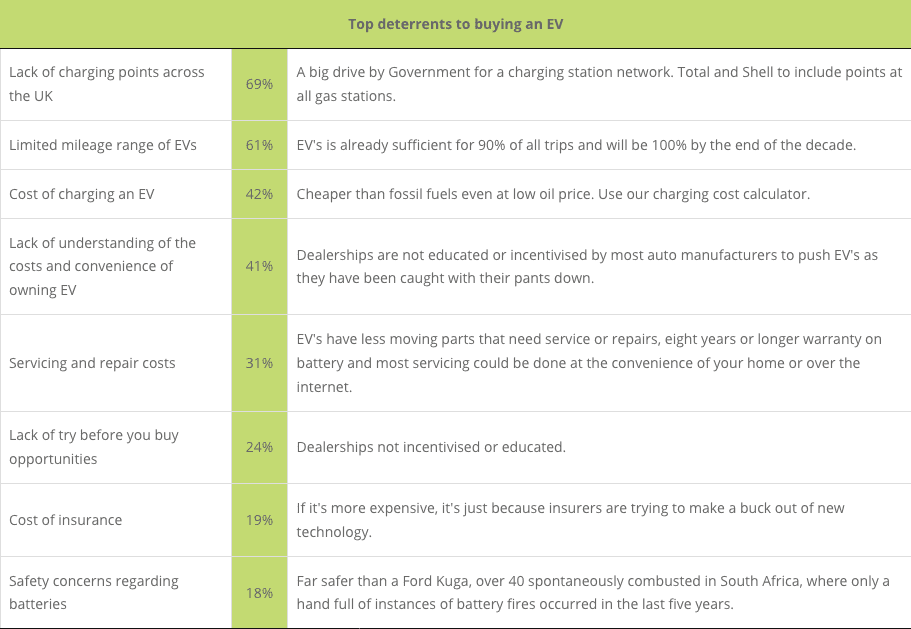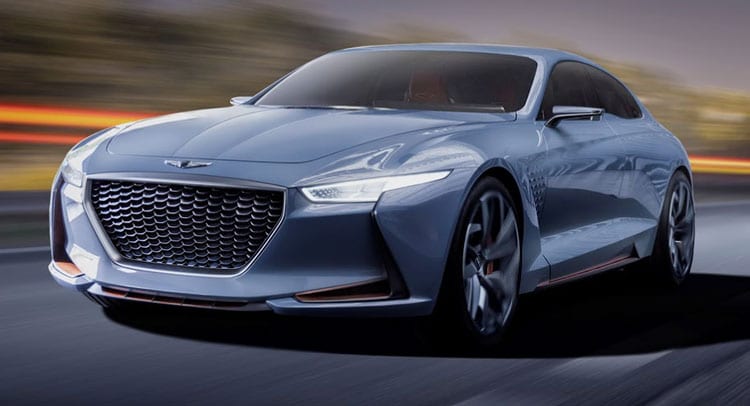Are you looking for the perfect electric vehicle? Need to compare electric vehicles? Our easy to use tool, EV4U, helps you to find the perfect electric car! 
ONE
News from the past week shows the that the pendulum is swinging quicker than expected for electric vehicles. The results of two surveys in the UK this week was a clear indication that demand for electric vehicles is much more than most automakers anticipated. Google searches for the electric vehicles has also surged by 127%.
A survey by Venson Automotive Solutions shows that 85% of respondents from a survey in the UK are now seriously considering buying an EV. Reading between the lines, wattEV2Buy finds it significant that range is no longer the deterring factor when prospective buyers are considering buying an EV. For long, most respondents to such surveys cited range as overarching reason for not buying an EV. In the Venson Survey, a lack of charging stations was the biggest reason for prospective buyers to put off the buying decision. In a separate survey by Carbuyer, 61% of respondents said they would not buy diesel vehicles again because of “diesel gate,” the spectacular “own goal” by big auto. Diesel sales were down 9% in the UK for the month of February while plug-in vehicles rose by 49%.
Most automakers have caught on to the shift, but not aggressive enough, while others are being forced to produce plug-in electric vehicles. Labor organizations within Audi have asked management to build more electric vehicles, as some of the factory units fear missing out on the technology will lead to job losses. Hyundai was forced by shareholders to shift focus on Fuel Cell Hybrid Vehicles to plug-in electric vehicles, while Daimler has accelerated its massive $10 billion planned investment in EV’s. All these turnarounds in strategy pale in comparison to that of Sergio Marchionne, FIAT Chrysler‘s CEO, but more Hyundai, FIAT, and Daimler later in the post.
Below are the results of the Venson survey

TWO
Hyundai admits electric vehicles are an imperative. During the Los Angeles Auto Show in 2016, the company said that it planned to have 14 new alternative vehicles in the US by 2020. The planned product mix include’s four plug-in hybrids, four electric and one hydrogen fuel cell model. Thursday Mr. Lee shed some more light on the company’s plans, indicating that the first fully electric vehicle planned for next year would be a small SUV. According to Mr. Lee, the SUV would have a range of 185 miles (300km). Although the company is developing its own dedicated platform, it can’t say when it would be ready. The platform is modeled after that of Tesla, with the batteries in the floor, allowing for more battery capacity and cabin space. It is clear from the announcement that the company is aggressively trying to catch up on lost ground.
Hyundai now expects the EV market to be around 10% of the global fleet by 2025, at which point Fuel Cell EV’s will take off. Hyundai’s luxury brand, Genesis also announced today that it would introduce a PHEV by 2019 and BEV by 2021.
THREE
With the run-up to the Formula E to be held in Mexico City today, Ferrari came out in support of the event. FIA’s Auto magazine quoted the CEO of FIAT Chrysler, one of the auto industries biggest naysayers of EV’s, Sergio Marchionne as follows in an interview:
“The first is that we need to be involved in Formula E because electrification via hybridization is going to be part of our future.”
“We have already developed a hybrid supercar, La Ferrari,” he said, “and on future Ferrari models we will leverage new technologies as well as electrification.”
And this from a man that came out vehemently against the technology, saying it will never catch on.
FOUR
Daimler this week, after a board meeting in Berlin, announced that it would accelerate its $11 billion investment in electric vehicles by bringing it forward with three years from 2025, as announced last year to 2022. Reuters reported that the automaker’s aggressive stance are the result of it not being able to cut fleet emissions of 123gm CO2/km from 2015 to 2016 in Europe. Europe has set a very stringent target of 95gm CO2/km by 2020. Daimler’s own target for 2020 is 100gm CO2. The German automaker cites the popularity of SUV’s as the reason for it not cutting its emissions for the first time since 2007.
FIVE
GM acquired its second Y Incubator company, the Italian based OSVehicle, for $1.1 billion in a bid to develop a self-driving “Vehicle-as-a -Service” (VaaS).
OSVehicle provides an open-source platform to hobbyists and other start-ups. Customers can have a full EV platform, the Tabby EVO, shipped between $12,500 and $19,500. OSVehicle claim start-ups can save $2 million and 3-years in Research and Development by going the open-source route. The open-source platform enables for larger disruption in mobility options using electric vehicles. Imagine adding George Hotz’s self-driving car kit which he plans to market through his company comma.ai at a price of $1,000, and you can build your own “ai-chauffeur” driven zero emission vehicle.
GM aims to use OSVehicle to develop its EDIT modular self-driving car based on the Chevy Bolt M1 platform. The decision was influenced by the ability of modular platforms to extend the lifespan of heavy use vehicles, such as ride sharing and hailing applications. OSVehicle‘s Yuki and Tin Hang Liu claim that through the use of modular architecture, car fleets can last ten times longer by enabling seamless hardware upgrades of self-driving and connected car technologies.
Picture: Genesis Concept introduced at New York Auto Show

